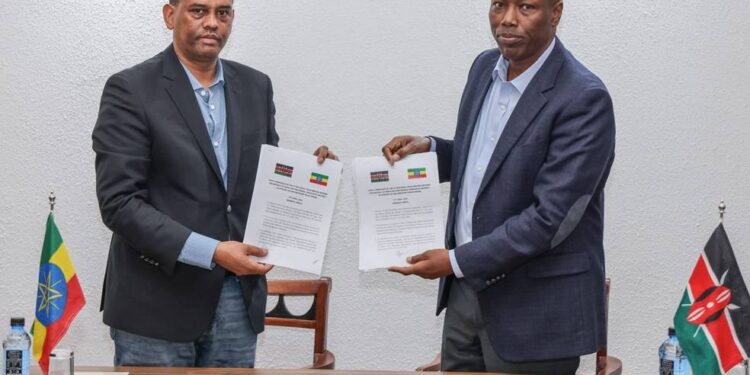Kenya and Ethiopia have signed a new agreement to ease trade across the Moyale border, setting a transaction threshold of $1,000 for goods traded under the African Continental Free Trade Area (AfCFTA). The deal, concluded in Mombasa after two years of negotiations, aims to simplify customs procedures, reduce informal trade, and encourage small-scale commerce between the two nations.
The Memorandum of Understanding (MoU) establishes border trade zones that span 100 kilometers into Kenya and 50 kilometers into Ethiopia. It allows traders to conduct transactions worth up to $1,000 per trip, with a maximum of four trips per month, on a mutually agreed list of goods. These changes are expected to boost official trade volumes and support economic activity in historically underserved frontier regions.
Kenya’s Cabinet Secretary for Investments, Trade, and Industry, Lee Kinyanjui, described the agreement as a step toward greater regional integration and an opportunity to address challenges faced by local communities. He also highlighted that sectors such as tourism and manufacturing in Mombasa and beyond could benefit from increased trade flows.
In 2023, Kenya exported goods worth $86.2 million to Ethiopia, including vegetables, mineral fuels, iron, and manufactured products, according to the International Trade Centre. Imports from Ethiopia totaled $36.7 million, mainly consisting of coffee, livestock, tea, and oilseeds. The new framework is expected to build on these volumes by streamlining customs processes and reducing the prevalence of informal trade routes.
Ethiopia’s Minister of Trade and Regional Integration, Kassahun Gofe, said the agreement addressed key issues including the scope of border zones, trade thresholds, travel frequency, and standardization of products eligible for trade. He called for technical teams to finalize the list of goods and complete the legal instruments necessary for implementation.
The trade pact is aligned with broader objectives under the AfCFTA, which aims to create a single market across 55 African countries. The United Nations Economic Commission for Africa estimates that full implementation of the AfCFTA could increase intra-African trade by 40 percent by 2030.
This latest development also complements existing cooperation between Kenya and Ethiopia in the energy sector. A 25-year power purchase agreement signed in 2022 allows Kenya to import up to 400 megawatts of electricity from Ethiopia, further strengthening economic ties and enabling more efficient industrial growth.
Kenya’s focus on deepening trade and energy links with Ethiopia reflects a broader strategy to position itself as a regional logistics and production hub. By facilitating trade, investing in infrastructure, and forging cross-border partnerships, Kenya is creating conditions for inclusive and sustainable economic development across East Africa.
Kenya’s foreign exchange reserves have climbed to a historic high of nearly $10.59 billion, according to the latest financial markets bulletin released by the Central Bank of Kenya...
Read moreDetails









